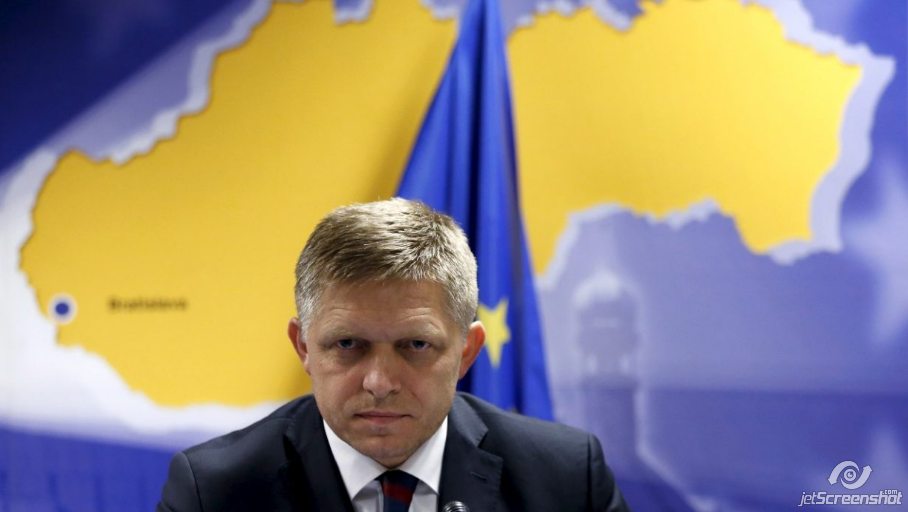By James Thomson, for CEPA
The country’s anti-American opposition is exploiting a strategic mess that it helped to create.
Russia’s disinformation strategists can be well pleased with the current political mood in Slovakia. For years following its accession to NATO in 2004, the country was blissfully distant from the threat of war. Now the Ukraine crisis has brought a potential enemy much closer, and a plurality of Slovaks blame NATO and the US.
In the eyes of 44% of citizens, according to a poll last month, the US and the transatlantic alliance have caused the threat faced by Ukraine. Some 35% blamed Russia.
This partly reflects a long tradition of pro-Russian sentiment in Slovakia but, more recently and powerfully, intense confusion generated by pro-Russian disinformation campaigns that have swept across the Slovak-language internet. Research suggests Slovakia is particularly vulnerable to conspiracy narratives, while professional propagandists pop up regularly in public life.
This is having serious consequences for possible alliance plans to station forces in the country, on Ukraine’s western border. The man behind much of the anti-Western rhetoric, former prime minister Robert Fico, appears to be reveling in the fight. This week he upped the rhetorical ante, branding President Zuzana Čaputová — a centrist who enjoys widespread international respect — “an American agent”.
The country has been treated in recent days to extraordinary scenes in parliament. Lawmakers spent February 8 dousing fellow MPs in water, blowing whistles to drown out attempts to debate the country’s defense, and pushing and shoving each other in what at times came perilously close to a brawl. At one point, nationalists draped a Slovak flag over the speaker’s podium, while pro-government opponents responded by holding aloft a Ukrainian flag.
Outside, a noisy crowd numbering in the thousands sounded klaxons, waved banners, and roared appreciatively at impassioned speeches by, among others, Fico.
The cause of this outrage?
A defense cooperation agreement between the US and Slovakia, was finally passed by 79-60 on February 9. The deal is virtually the same as that signed by most NATO members and allows the sharing of military facilities.
James Thomson
This has been painted by Fico and his allies as a mortal threat to Slovakia’s sovereignty. Slightly inconveniently, it was Fico’s own government that initiated the pact, although that has not stopped him from damning it in the most histrionic terms — nor many Slovaks from accepting his condemnation at face value.
The former prime minister — now leading in the opinion polls — is not alone in his over-wrought description of the agreement. Other nationalist-populist movements, including two explicitly neo-Nazi groups (whose MPs brought the water-spraying and whistle-blowing to the debate), were also heavily engaged.
Fico is in many ways a fascinating figure, as his political acrobatics demonstrate. A student of law, he joined the Communist party in the 1980s, but began a political journey after the 1989 revolution. Now a socially conservative populist who styles himself a social democrat, his 10 years as premier (until 2018) were marked by constant castigation of his liberal predecessors (and endless attacks on journalists, whom he describes as prostitutes and even “toilet spiders.”) Yet he faithfully observed the free-market reforms implemented to secure Slovakia’s accession to the EU in 2004.
In a similar fashion, Fico affected close ties with Russia — for instance, joining President Vladimir Putin for commemorations of the 70th anniversary of the end of World War II in Moscow in 2015, an event which most other European leaders chose to boycott in the wake of the annexation of Crimea — all the while pursuing a conventional Euro-Atlantic defense policy that hewed closely to NATO.
He denounced post-Crimea sanctions against Russia as “useless” (but quietly voted for them in Brussels) while his government sent troops to Iraq and Afghanistan, and agreed to buy US-made Black Hawk and F-16 aircraft to re-equip Slovakia’s dilapidated Soviet-era air force.
Now, out of government and threatened by a split in his own party, Fico the political survivor is focused on reviving his political fortunes. First elected to parliament in 1992, during the dying days of the Czechoslovak Federation, he has always been adept at manufacturing political ammunition.
A casual reference in a recent New York Times story suggesting the potential deployment of NATO forces along the alliance’s eastern flank, including Slovakia, prompted a round of denunciation and political breast-beating.
On that occasion, Fico successfully goaded the coalition government into denying the report – only for it to realize, as the situation around Ukraine deteriorated, that it might indeed need to host some NATO troops, if only to shore up Slovakia’s own rather threadbare defenses.
The fact that Slovakia was actually invaded by the Soviet Union in 1968 and occupied by mainly Russian forces until the fall of communism is, perversely, used to justify opposition to a conjectured “occupation” — by America. There are, to be clear, no American troops currently based in Slovakia.
Slovakia’s government remains resolutely pro-NATO, and has strongly backed Ukraine in the current stand-off. Indeed, on the same day as the antics in parliament — which were designed to forestall a vote on the defense deal — Foreign Minister Ivan Korčok was in Kyiv showing support for the government there.
Protests notwithstanding, public sentiment remains generally pro-Western and Slovakia’s strategic orientation will not change: for all his fulminations, even Fico is not proposing to quit NATO, for the simple reason that the country has no realistic alternative.
Shortly after parliament voted to approve the US-Slovak defense deal, President Čaputová ratified it, putting it into effect. But if and when allied troops are actually deployed to Slovakia, NATO can expect to hear a lot more from Fico and his supporters.
By James Thomson, for CEPA
James Thomson is is a columnist for The Slovak Spectator, the Bratislava-based English-language newspaper and website.
Photo: Slovakia’s Prime Minister Robert Fico addresses a news conference after a European Union leaders extraordinary summit on the migrant crisis in Brussels, Belgium September 24, 2015. Credit: REUTERS/Francois Lenoir





